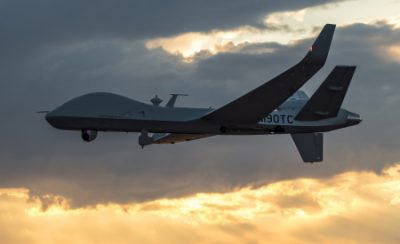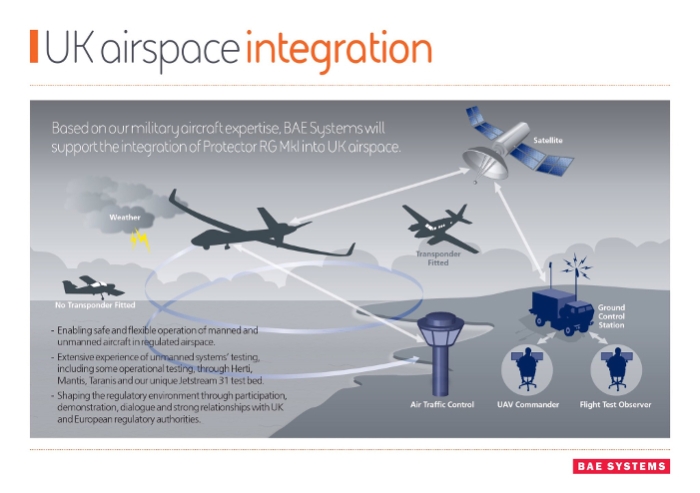General Atomics Bring in BAE Systems to Lobby for ‘Protector’ Drone to Fly in UK

Drone manufacturer, General Atomics, hosted an event in London on 24 January in order – as its press release put it – “to recognize UK companies that are contributing to operational systems such as MQ-9 Reaper and MQ-1C Gray Eagle, and the new MQ-9B SkyGuardian RPA program” (which the UK MoD is calling ‘Protector’).
As part of the day, the US company signed agreements with three major UK defence companies: Raytheon, MBDA and BAE Systems. Raytheon will supply and integrate Paveway IV bombs onto the new British drone while MBDA will integrate and supply it with the new Brimstone missile. BAE Systems, however, will play a wider role, helping to enable the new drone to be flown within the UK airspace.
Currently, large remotely controlled drones are not allowed to fly in unsegregated airspace within the UK due to safety concerns. We have previously detailed the difficulties that the MoD and General Atomics have had in convincing airspace regulators that ‘Protector’ can be flown safely in UK airspace. In July 2018, the company remotely piloted a SkyGuardian cross the Atlantic and landed it at the Fairford airbase. Severe restrictions were put in place for the flight into UK airspace with all other aircraft directed away for the period of time the drone was in the air. The aircraft was then disassembled and put into crates for its return journey to the US. Defence News reports today that ‘Detect and Avoid’ technology (still largely unproven), may be added to Protector in an effort to persuade regulators.
General Atomics reports that BAE Systems will now collaborate with them on enabling the integration of the new military drone into UK national airspace. In a graphic shared on social media, BAE said that it will support General Atomics through its experience of testing unmanned systems and “shaping the regulatory environment through participation, dialogue and strong relationships with UK and European regulatory authorities.”

BAE Systems says it will aid integration of the Protector drone into UK airspace
General Atomics is banking on gaining the support of UK regulators for its new large drone to fly in civil airspace as this will then likely open up the airspace of other countries – particularly in Europe – to its drones. CEO of General Atomics, Linden Blue stated “Protector will be an example for other allied nations to follow” adding “thereby creating more opportunities for UK aerospace industry.”
The Civil Aviation Authority (CAA) is now likely to come under real pressure from BAE Systems and its political connections to approve changes which will allow the drone to fly within UK airspace. This at the same time regulators are working hard to prevent the disruption and threat of small drones in the wake of the chaos caused at Gatwick.
There has been no public or parliamentary debate about the implications and impact of large military drones flying in UK airspace even though CAA representatives express clear reservations about whether technological solutions will provide the right level of safety for the public. It should be noted that large military drones regularly crash on training flights in the US as well as on operations overseas.
Aside from the obvious safety issues, once ‘Protector’ drones are allowed to fly within the UK, as well as for training flights it is certainly possible that they will be used by what is discreetly referred to as ‘Other Government Departments‘ for security operations within the UK. It is surely right that the implication of this – and what the limitations are – should be openly discussed and debated.
The growing use of armed military drones is a real danger to global peace and security. Their integration within UK airspace will further normalise their use. This attempt by a US military drone manufacturer in collaboration with BAE Systems to put pressure on UK airspace regulators needs to be watched carefully.
Meanwhile, while the MoD has always been very coy about which UK companies are supporting US Predator and Reaper drone operations. General Atomics, however, has no such qualms and detailed in its press release which UK companies are involved with Reaper and the new ‘Protector’ drone
- Abaco Systems – Provides a DO-178 and DO-254 compliant computer that processes flight critical functions for the MQ-9B Ground Control Station (GCS)
- BAE Systems – Will support development of Concepts of Operations (CONOPS) for Protector operations in UK national airspace
- CAE – Will develop a comprehensive synthetic training system for Protector RG Mk1 flight crews
- Cobham Aviation Services, UK – Provides ongoing logistics and maintenance services for the RAF Reaper fleet
- Cosworth – Provides engine development and manufacturing services for GA-ASI’s MQ-1C Gray Eagle Unmanned Aircraft System, operated by the US Army
- Daco Hand Controllers – Supplies pilot Stick and Throttle hand-controllers for the GCS, as well as a specially designed hand controller that aids in target tracking
- Defence Electronics & Component Agency (DECA) – This UK MOD Agency provides MRO, upgrade and managed services in support of Defence
- GKN Aerospace – Supplies MQ-9 landing gear and fuel bladders, and is an approved supplier of carbon-composite tail structures
- Leonardo – Supports integration of its Seaspray maritime, surface-search radar and SAGE electronic support measures (ESM) sensor on MQ-9B
- MBDA – Supplies Brimstone missile for Protector
- Raytheon UK – Supplies Paveway IV precision-guided munition for Protector
- Ultra Electronics Command & Sonar Systems – Provides miniaturized sonobuoys suitable for MQ-9B
*
Note to readers: please click the share buttons above. Forward this article to your email lists. Crosspost on your blog site, internet forums. etc.
Featured image: SkyGuardian MQ-9B, dubbed ‘Protector’ by UK MoD

